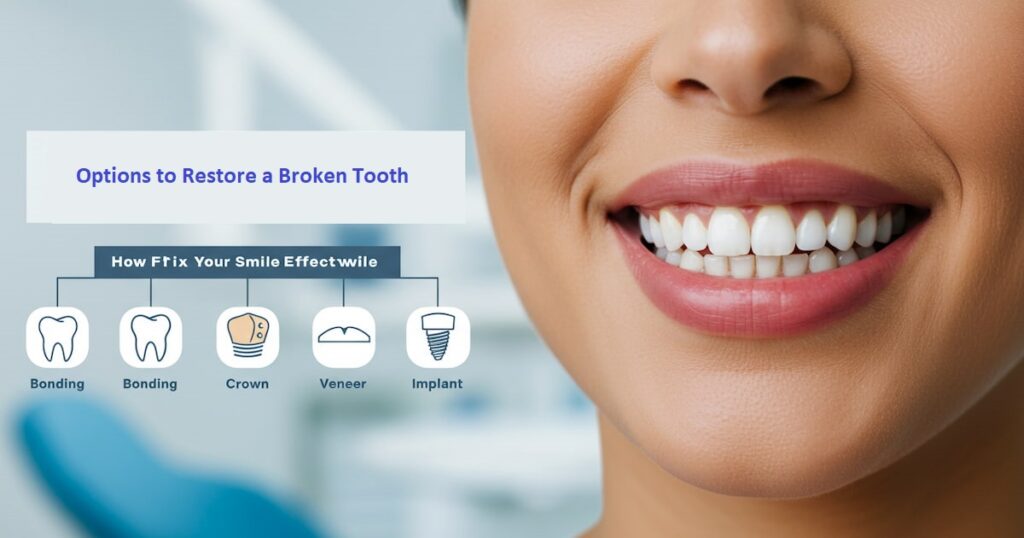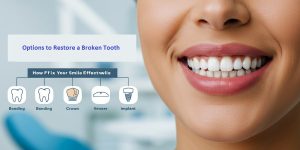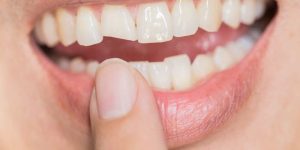Dealing with a broken tooth? No worries! Modern dentistry offers several effective ways to fix it, such as dental bonding, veneers, crowns, or implants. You may be suffering from a small chip from biting something hard or a more serious crack from an injury. Either way, there’s a solution to treat your broken tooth and restore its function and appearance. In this blog, we discuss your options for this specific dental issue and explain how each restoration option benefits you.
Options to Restore a Broken Tooth
The right dental treatment option depends on the extent of the damage. Here’s a quick review of your options.
| Tooth Restoration Option | Best For | How It Works | Longevity |
| Dental Bonding | Small chips and cracks | Tooth-colored resin is applied & shaped | 5 to 10 years |
| Dental Veneers | Minor chips and discoloration | Thin porcelain shells cover the front of the tooth | 10 to 20 years |
| Dental Crowns | Large fractures or weakened teeth | A cap covers and protects the tooth | 10 to 15 years |
| Dental Implants | Tooth beyond repair | A full tooth replacement with a titanium post and crown | Over 15 years with good care. |
Your dentist will recommend the best option based on your tooth’s condition.
Dental Bonding
Dental bonding is a quick and affordable way to fix minor tooth damage like small chips or cracks. In this procedure, your dentist applies a tooth-colored resin to the broken area, shapes it to match your natural tooth, and then hardens it with a special light.
If you’re dealing with:
- Chipped tooth,
- Small cracks,
- Slight enamel wear,
This treatment may be the best option for you.
Did You Know?
Bonding usually doesn’t require any numbing and can be done in a single visit. It’s a great choice if you’re looking for a fast fix to restore your smile without breaking the bank.
Dental Veneers
Dental veneers are thin shells of porcelain or composite resin that cover the front surface of a tooth. They’re often used in cosmetic dentistry to restore broken or worn teeth and improve your overall smile. Dentists usually suggest this treatment for a cracked tooth, an uneven or misshaped tooth, and discoloration from damage.
Veneers are custom-made to match the shape and color of your other teeth. They’re popular among celebrities for a reason; they can completely transform your smile while protecting the damaged tooth underneath.

Dental Crowns
A dental crown is a cap that fully covers and protects a damaged tooth. It’s commonly used when a tooth is badly broken, decayed, or weakened after a root canal. They are made from durable materials like porcelain, metal, or a mix of both. With proper care, a crown can last 10 to 15 years or even longer.
Which Type of Crowns Lasts Longer?
Each crown material has its own lifespan, strengths, and ideal uses. On the list below, you can learn about each crown type’s longevity, according to an article published on Healthline.
- Zirconia crowns: Known for their exceptional strength and fracture resistance, zirconia crowns can last 10 to 15 years or longer, making them ideal for back teeth under high bite pressure.
- Porcelain-fused-to-metal (PFM) crowns: A popular choice for their natural appearance, especially on front teeth, PFM crowns typically last 5 to 15 years, though they may show metal edges as gums recede.
- Lithium disilicate crowns: These strong, aesthetic glass-ceramic crowns last at least 5 to 15 years, and can be made and placed in a single dental visit.
- Gold crowns: The most durable option, gold crowns have a 95% survival rate over 10 years, and can often last for several decades.
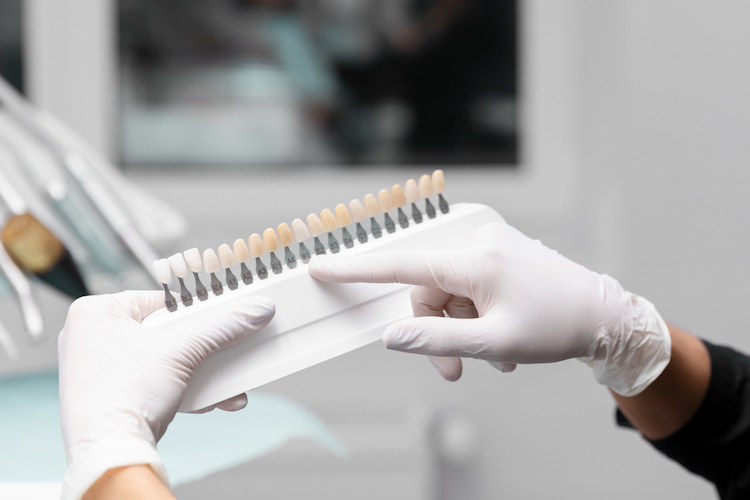
Dental Implants
If your tooth is broken below the gum line or the root is damaged beyond repair, a dental implant treatment might be the best option to restore your smile permanently. This restorative dentistry treatment is a long-term solution to replace a broken tooth that can’t be saved. An implant is a small titanium post placed into your jawbone, topped with a custom crown to look and feel like a real tooth.
What Makes Implants a Valuable Investment?
- Implants are the closest thing to natural teeth.
- They help prevent bone loss in the jaw.
- They maintain your facial structure.
- They boost your oral health and appearance for a lifetime.
What Are the Impacts of Broken Teeth on Oral Health?
Broken teeth can significantly impact your oral health, even if the damage seems minor at first. When a tooth is cracked, chipped, or fractured, it creates an entry point for bacteria, leading to tooth decay, infections, or even abscesses if left untreated. In some cases, the damage may extend to the inner layers of the tooth, which affects the pulp and potentially.
Beyond the immediate damage, broken teeth can also affect your dental health in the long run. Here’s how:
- Disrupting your bite alignment and overall oral function.
- Straining other teeth and leading to uneven wear or jaw pain.
- Negative effects on tooth structure, speech, and chewing efficiency.
Restore Your Smile with Pear Dental Group
A broken tooth doesn’t have to mean a broken smile. At Pearl Dental Group, we offer personalized solutions like bonding, crowns, veneers, and implants, all designed to bring back the function and beauty of your teeth.
Common Causes of Broken Teeth
Now that you know there are various options to restore your broken tooth, it’s worth learning what causes this dental problem.
| Cause | Description |
| Trauma or Injury | Falls, car accidents, or sports injuries (like a hockey hit) can crack teeth and often require urgent dental care. |
| Tooth Decay | Deep cavities weaken the enamel and dentin, making teeth more likely to break. Regular dental checkups help catch decay early. |
| Biting Hard Foods | Chewing on ice, hard candies, or popcorn kernels can chip already weak teeth. Avoiding hard foods helps protect tooth enamel. |
| Teeth Grinding (Bruxism) | Nighttime grinding wears down teeth and leads to cracks. A custom mouthguard can protect teeth while you sleep. |
| Aging or Weak Enamel | Enamel naturally wears with age or from large, old fillings, making teeth more fragile. Regular checkups help monitor and protect weak areas. |
How to Prevent Future Tooth Damage
Restoring a broken tooth is very important, but preventing another break saves you pain and dental emergencies. Avoid biting on hard foods like ice, bones, or candies that can chip teeth, and wear a mouthguard if you grind your teeth at night or play sports. Another important way to prevent broken teeth is to keep them strong. For that, you should have good oral hygiene, with daily brushing and flossing, while regular dentist visits catch weak spots early.
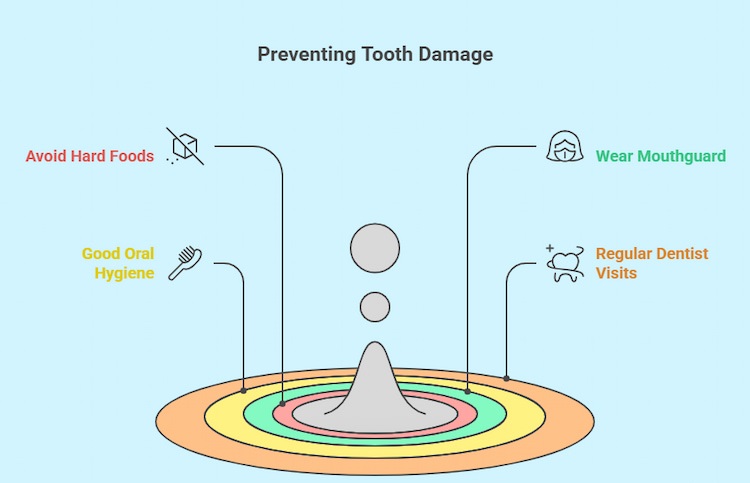
Conclusion
There are several options to restore a broken tooth, like crowns, veneers, or implants, that can quickly repair damage and boost your smile. Acting fast and adopting preventive habits, such as wearing mouthguards, protects your teeth from future breaks.
At Pearl Dental Group, we offer personalized, long-lasting solutions for broken tooth reconstruction in North York, like bonding, crowns, veneers, and implants, to restore your teeth and confidence. But that’s not all! We can also fix your broken veneer or broken crown. The solution is just one call away! Book your appointment today and let our experienced dental team bring your smile back to life!
FAQs
-
What are the best options for restoring a broken tooth?
For small chips, bonding is the best tooth repair option that uses tooth-colored resin to fix the tooth in one quick visit, ideal for minor cosmetic fixes. Larger fractures often require crowns, which cap the tooth to restore strength and appearance, while severe cases may need implants to replace a tooth that can’t be saved.
-
How long does it take to restore a broken tooth?
Simple fixes like bonding can be completed in a single 30 to 60-minute dental visit, perfect for minor chips. Crowns require two to three appointments over a few weeks, including prep and fitting, while implants take months due to surgical placement and bone healing.
-
Are dental implants a better option than crowns for restoring a broken tooth?
Crowns are often better if the natural tooth can be saved. However, implants are ideal for teeth beyond repair, offering a durable, long-term replacement that mimics a natural tooth but requires surgery and healing.
-
How much does it cost to restore a broken tooth?
Bonding is the most affordable, ranging from $300 to $600 per tooth. Crowns cost $1500 to $1900, while implants, which involve surgery, range from $3600 to $6500 or more. The cost of veneers depends on the materials. Composite veneers cost $300 to $600 and ceramic veneers cost $800 to $1200.
-
Is restoring a broken tooth painful?
Dental restorative treatments are usually painless, thanks to local anesthesia used during procedures like bonding, crowns, or implants. You may feel mild soreness or sensitivity for a few days after treatment, especially with crowns or implants, but this is manageable with over-the-counter pain relievers or prescribed medication.
Have you ever had to deal with a broken or chipped tooth? What treatment worked best for you? Share your experience in the comments below. We’d love to hear your story and help others learn from it!



